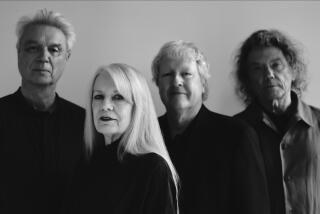An exuberant view of the Futureheads
- Share via
The Futureheads’ music is a sonic incarnation of the heart, a physical representation of the way human emotions rise and fall, build up and surge, clash and conflict, soar to the heavens and go down the drain.
That’s why the British band’s sound so often engages the spirit instead of merely impressing with its virtuosity. At the Henry Fonda Theatre on Monday, the Futureheads transplanted the instrumental dynamics and vocal acrobatics of their records to the concert stage, a key step toward fulfilling the promise they’ve displayed on their two albums.
The quartet from Sunderland, in England’s remote northeast, has been jostling within the crowded pack of new British rock bands, including Bloc Party, Keane (which is due at the Fonda tonight) and Snow Patrol (which postponed its shows scheduled here this week).
The Futureheads haven’t established the commercial profiles of those rivals, but the amiable, down-to-earth musicians had a loyal following cheering them on at the Fonda, and in their ambitious vocal interplay they have an unmistakable stylistic signature.
It’s not easy to pull off in concert, but they deployed their voices in striking combinations, from straight Beach Boys-like harmony to manic, back-and-forth exchanges that made many of the songs seem like mini-operettas. Singer-guitarist Barry Hyde has a plaintive, slightly ironic sounding Brit-rock lead voice, but the songs really rely on the massed and tossed vocals.
There’s a giddy exuberance in this highly melodic music, which bears traces of Queen, the Who, Sparks and Gang of Four, among others, and rides on a dynamic underpinning of precise, clipped and explosive guitar rock.
But by the end of its hour-plus set it was seeming a little one-dimensional. The recent second album, “News and Tributes,” shows marked growth in songwriting craft and emotional range, but at the Fonda the band missed a chance to vary the pace and broaden reach by skipping the title song, an atypically downbeat lament about a 1958 plane crash that killed several members of the Manchester United soccer team.
More to Read
The biggest entertainment stories
Get our big stories about Hollywood, film, television, music, arts, culture and more right in your inbox as soon as they publish.
You may occasionally receive promotional content from the Los Angeles Times.










